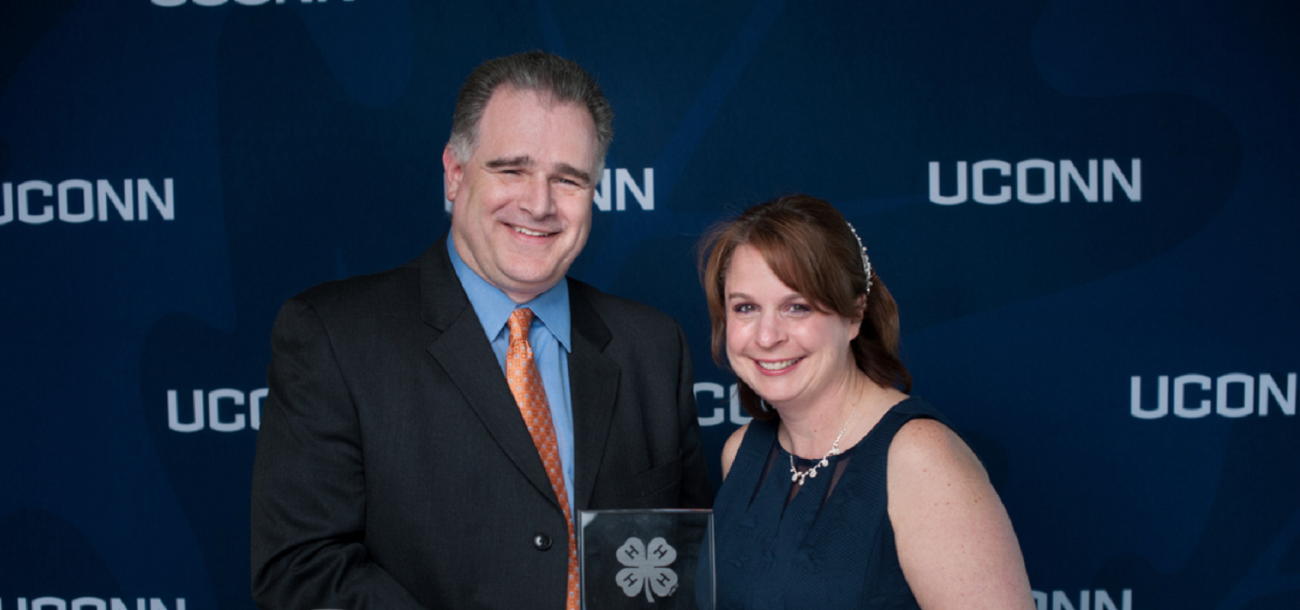For Rachael Manzer, a doctoral candidate in the Neag School of Education, life-transformative education takes many forms.
Manzer is a five-year volunteer of the UConn 4-H Program, a leader with the Granby 4-H Club, a member of the NASA Network of Astronaut Teachers (NEAT), and a candidate for commercial space flight through Teachers in Space, Inc. In 2019, Manzer received the UConn College of Agriculture, Health and Natural Resources (CAHNR) 4-H Leadership Award, and was recently selected as the 2021 Northeast 4-H Volunteer of the Year Award. All of these experiences helped lead her to pursue a doctorate at UConn, but the seeds were planted much earlier, during her youth as a member of the UConn Litchfield County 4-H Club.
“Growing up in 4-H, I attended a lot of 4-H programs right on the UConn Storrs campus, from science and engineering programs to livestock programs,” Manzer says. “To me as a kid, UConn was this big, amazing place – a place of excitement and innovation.”
Currently, Manzer is the STEM Coach for Winchester Public Schools. In the past, she worked in the education department at NASA Langley Research Center in Virginia. In that role, Manzer worked with scientists, astronauts, and engineers to share the latest breakthroughs in STEM with teachers and students across the United States.
Manzer has increased opportunities for STEM learning by establishing the only 4-H VEX Robotics Program in New England through her volunteer service with UConn – an effort that boasts its own “Cinderella story” of big dreams, limited resources, and the dedicated efforts of a team to make their dreams reality.
In 2015, she started 4-H Robotics with participants who had no idea how to build and program robots. After only one year, the 4-H VEX Robotics Project group grew so large that it expanded to include a competition team as well as a high school VEX Robotics Project group. The team qualified for the VEX World Championships four times, including this year, despite the challenges of the pandemic. For many of the UConn 4-H members, the robotics team was the only interaction with others they had outside the home.
In her role with UConn 4-H, Manzer guides club members in designing robots, seeking sponsors, and providing meeting space for the group. She works with members to prepare them for the various roles they encounter as part of the team, such as planning and implementing the building of the robot, public speaking presentations, fundraising, marketing, and community service demonstrations with robots.
Manzer’s passion for developing lifelong learners closely is why she chose the Neag School of Education to pursue her Ph.D.
“I want to dig deeper into academic research and evaluation of STEM instructional techniques and innovative program designs in hopes to contribute to the understanding of STEM education,” she says. “My hope is that with advanced training in curriculum and instruction, I could one day conduct research that could help guide school districts, informal organizations, state policy, and or government programs in developing and strengthening STEM education.”
She believes UConn was an ideal fit for her: “UConn is a top research university, and the faculty is outstanding and committed to help everyone grow to their fullest potential and the courses are rigorous and invigorating.”
Manzer’s experiences have enhanced her role as a doctoral candidate, according to her advisor, Neag Endowed Professor of Teacher Education Suzanne Wilson.
“As a graduate student at UConn, Rachael has brought this wealth of experience to her doctoral studies, exploring questions of science education from this broader perspective of how teaching and learning occur in the formal institutions of school, in informal settings in clubs, organizations, and cultural institutions, and in our everyday lives,” Wilson says.
The insights she’s gaining in the Neag School of Education complement the skills and knowledge she’s already acquired, Manzer says.
“Neag is helping me grow and develop my research tools in order to look beyond the surface features of any program,” she says. “In 4-H, these tools have helped me to take a closer look at education design and delivery of programs, examining positive youth development skills, development of agricultural STEM literacy, and much more.”
In 2020, volunteers donated 141,097 hours to UConn Extension programs, including 4-H, with a value of $3.8 million to the communities served. Learn more about becoming a volunteer or enrolling your child in the UConn 4-H program at http://4-H.uconn.edu/.



